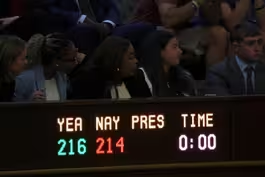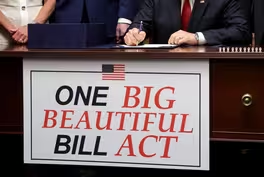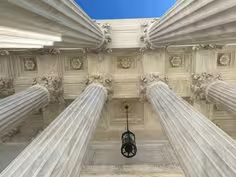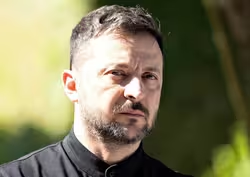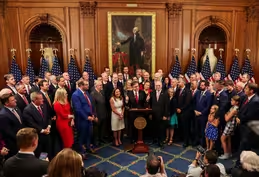
Chicago sees historic drop in violent crime
Clip: 7/3/2025 | 5m 11sVideo has Closed Captions
Chicago sees historic drop in violent crime during first half of 2025
The city of Chicago saw a historic drop in homicides in the first half of the year, a trend that has largely been mirrored nationwide. For a deeper look at the state of violent crime in the U.S., William Brangham spoke with Jeff Asher. His Real-Time Crime Index compiles data from hundreds of law enforcement agencies nationwide.
Problems playing video? | Closed Captioning Feedback
Problems playing video? | Closed Captioning Feedback
Major corporate funding for the PBS News Hour is provided by BDO, BNSF, Consumer Cellular, American Cruise Lines, and Raymond James. Funding for the PBS NewsHour Weekend is provided by...

Chicago sees historic drop in violent crime
Clip: 7/3/2025 | 5m 11sVideo has Closed Captions
The city of Chicago saw a historic drop in homicides in the first half of the year, a trend that has largely been mirrored nationwide. For a deeper look at the state of violent crime in the U.S., William Brangham spoke with Jeff Asher. His Real-Time Crime Index compiles data from hundreds of law enforcement agencies nationwide.
Problems playing video? | Closed Captioning Feedback
How to Watch PBS News Hour
PBS News Hour is available to stream on pbs.org and the free PBS App, available on iPhone, Apple TV, Android TV, Android smartphones, Amazon Fire TV, Amazon Fire Tablet, Roku, Samsung Smart TV, and Vizio.
Providing Support for PBS.org
Learn Moreabout PBS online sponsorshipWILLIAM BRANGHAM: At least four people were killed and 14 others were wounded in a drive-by shooting in Chicago overnight.
Witnesses described the scene as a war zone.
Police say the attacker fled and no one is in custody.
Despite this horrific shooting, the city of Chicago saw a historic drop in homicides in the first half of the year.
That's a trend that's largely been mirrored nationwide.
So, for a deeper look at the state of violent crime in the U.S., I spoke earlier today with Jeff Asher.
His Real-Time Crime Index compiles data from hundreds of law enforcement agencies nationwide.
Jeff Asher, great to have you back on the program.
Let's talk about this event in Chicago overnight, a horrible drive-by shooting.
People see headlines like that, and they certainly are led to believe that we are in this violent crime spiral.
Help us put these kinds of events into context.
JEFF ASHER, Co-Founder, AH Datalytics: Well, it's very difficult.
First off, you don't ever want to downplay the tragedy, downplay the horror.
Even when you're talking about dramatic declines in gun violence, dramatic declines in murder, you're still talking about too many of these incidents, too many of these tragedies.
That said, it's difficult for people, I think, to put these things in context, because very rarely or never do you see a story there were no shootings yesterday, there were no murders yesterday.
It's only in the presence of these tragedies that these things come to media attention.
So, the fact of the matter is, Chicago has seen, I think, a 40 percent decline in shooting victims this year compared to the same time frame last year.
It's seen a 30-something percent decline in murder.
Nationwide, in cities of all sizes, we're seeing double-digit, 20-something percent declines in murders.
So we are seeing these declines occurring pretty much everywhere, including in Chicago.
But you also have something like this that comes to the public attention that very rightly so gets a lot of press and a lot of attention.
It's just very challenging, I think, to balance that with the overall big-picture trend, which is certainly far more rosy.
WILLIAM BRANGHAM: Do you have any sense as to why those numbers are coming down so dramatically?
JEFF ASHER: It's literally a billion-dollar question in terms of if you knew the amount of resources and effort that you would put into it would be tremendous.
There's a real challenge to answering the question why.
We know that there aren't more police officers in the vast majority of cities nationwide compared to where we were even two or three years ago, much less five or six years ago.
We know that the root causes of violence really haven't been fixed.
Poverty is still around.
Education in a lot of cities still struggle.
We know that the country is still awash in guns, still awash in firearms.
There haven't been any tremendous changes there.
We know that murder clearance rates especially have kind of bounced around, but they're still low by historical standards, even despite the drop in murder that we have seen over the last two years.
So, putting all of that together, I think the most satisfying explanations are the big national explanations.
The one that pops to my mind the most is that, after COVID, we had all of this spending on social programs, a 90 percent increase in construction from local and state governments on social and neighborhood centers, a 50 percent increase in public safety spending construction, 20 percent increase in highway spending from state and local governments.
You had all of this spending, all of this hiring, all of these things that maybe weren't specifically tied to violence reduction, but that have had this kind of ancillary benefit of helping to interrupt these cycles of violence that started in 2020 and 2021 and bring violence to what could be some of the lowest levels that have ever been recorded in the country.
WILLIAM BRANGHAM: One of the things you mentioned as possible factors in this decline might be reversed soon.
The Trump administration has eliminated a lot of grants to community-based violence prevention efforts.
Do you have any concern that that might have a negative effect on these positive trends you're seeing?
JEFF ASHER: I think the greater concern for me, rather than changing these programs is going to lead to an increase, is that, at some point, whether it's six months from now, three years from now, 10 years from now, we're going to see crimes start to increase.
These trends, these historic declines are not going to continue forever.
When that change happens, these are programs that are useful for arresting that change, for interrupting cycles of violence.
And if we have divested from these programs, then we're in a much worse position when these trends inevitably change for whatever reason to respond to that change.
WILLIAM BRANGHAM: All right, that is Jeff Asher, who is the co-founder of AH Datalytics.
Always great to talk to you.
Thank you very, very much.
JEFF ASHER: Thanks for having me.
House GOP passes Trump’s big tax bill by his July 4 deadline
Video has Closed Captions
Clip: 7/3/2025 | 7m 47s | House gives Trump a win as his big tax bill overcomes weeks of tense negotiations (7m 47s)
How manufacturers will benefit from Trump’s big bill
Video has Closed Captions
Clip: 7/3/2025 | 5m 18s | How businesses and manufacturers will benefit from Trump’s big bill (5m 18s)
'Make It Ours' explores how Virgil Abloh redefined fashion
Video has Closed Captions
Clip: 7/3/2025 | 8m 18s | Robin Givhan's 'Make It Ours' explores how Virgil Abloh helped redefine fashion (8m 18s)
News Wrap: Supreme Court will hear trans athlete cases
Video has Closed Captions
Clip: 7/3/2025 | 5m 38s | News Wrap: Supreme Court will hear transgender athlete cases in its next term (5m 38s)
Trump withholds billions in grants for school programs
Video has Closed Captions
Clip: 7/3/2025 | 5m 13s | Trump administration withholds billions in school grants for critical programs (5m 13s)
Ukraine concerned after U.S. holds back promised weapons
Video has Closed Captions
Clip: 7/3/2025 | 8m 35s | As Pentagon pauses some weapons for Ukraine, experts weigh in on U.S. priorities (8m 35s)
Why Republicans opposed to Trump's bill changed their minds
Video has Closed Captions
Clip: 7/3/2025 | 5m 57s | Why Republicans once staunchly opposed to Trump's bill changed their minds (5m 57s)
Providing Support for PBS.org
Learn Moreabout PBS online sponsorshipSupport for PBS provided by:
Major corporate funding for the PBS News Hour is provided by BDO, BNSF, Consumer Cellular, American Cruise Lines, and Raymond James. Funding for the PBS NewsHour Weekend is provided by...
